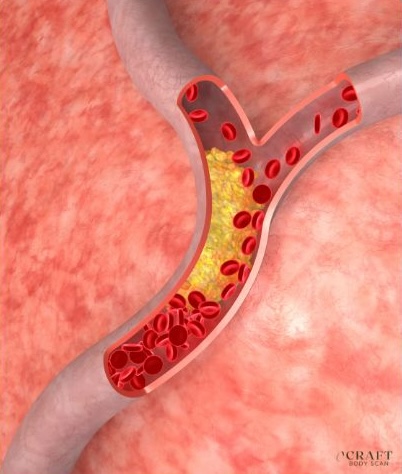Carotid Artery Screening & Ultrasound Scan
Quick Detection. Medical Precision. Lifelong Protection.
Quick Detection. Medical Precision. Lifelong Protection.
At Craft Body Scan, our Carotid Artery Screening is a specialized ultrasound test that looks the critical arteries in your neck that supply blood to your brain. Many people with narrowed carotid arteries show no symptoms until a stroke occurs. Our non-invasive screening can identify dangerous blockages long before warning signs appear. In under 20 minutes, our ultrasound creates detailed images of your carotid arteries, allowing our board-certified radiologists to spot potential stroke risks early. Take preventive steps now before a stroke occurs, and protect your brain health for years to come.

- Non-invasive
- Painless
- Fast (typically 15-20 minutes)
Why Carotid Artery Tests Matter
Stroke strikes without warning, claiming lives and leaving survivors with devastating disabilities every day. Plaque buildup in your carotid arteries quietly raises this danger by slowly blocking the blood path to your brain. Your risk goes up if you’re over 55, have high blood pressure, diabetes, or high cholesterol. People who smoke, have heart problems, or are men face higher risk too. The sad part? Many strokes could be stopped if found early. This simple test can spot problems while there’s still time to take action, possibly keeping you from becoming part of America’s third leading cause of death and disability.
Expert Care for Your Vascular Health
Specialized Stroke Prevention
Our carotid artery screening provides a detailed view of your neck’s vital blood vessels, examining the arteries responsible for delivering oxygen-rich blood to your brain. This focused ultrasound detects plaque buildup that could lead to stroke, offering crucial early warning when prevention is still possible.
Personalized Risk Assessment
No two individuals have identical vascular health, and risk factors vary widely. Our medical team takes your personal medical history, family background, and specific concerns into consideration when analyzing your carotid artery status. Your stroke risk profile is unique, and our assessment reflects your individual health situation.
Why Trust Craft Body Scan?
Our board-certified radiologists and medical professionals deliver accurate, insightful results thousands of patients nationwide depend on. We combine specialized medical knowledge with genuine commitment to your cerebrovascular health. Using advanced ultrasound technology, we capture high-resolution images of your carotid arteries with detailed visualization for a full assessment of your stroke risk.
What to Expect From Your Carotid Screening
Simple Booking
Scheduling your carotid artery screening is easy. Use our online booking system or give our team a call to choose a convenient date and time for your scan.
Preparation
Preparation for your carotid artery screening is minimal.
✓No fasting required
✓No special medications needed
✓Wear comfortable, loose-fitting clothing
Comfortable Procedure
Our carotid artery screenings are non-invasive and painless. You'll lie comfortably on the examination table, and our friendly technicians will guide you through each step.
Scan Duration
The ultrasound technician will apply a small amount of gel to your neck and move the transducer gently across the area. The entire screening typically takes just 15-20 minutes. After your screening, you can resume normal activities immediately as there is no downtime or recovery period.
Comprehensive Results
Our board-certified radiologists will analyze the images and provide you with a detailed report, which will include information about any plaque buildup, the percentage of artery narrowing (if present), and blood flow measurements. If abnormalities are found, we'll take the time to explain the results and discuss potential next steps for prevention or treatment.
See What a Carotid Artery Screening shows
Carotid Artery Screening Coverage
Comprehensive overview of what our carotid artery screening examines
Arterial Structure Assessment
Common Carotid Artery
Examination of the main portion of the carotid artery for narrowing, blockages, or structural abnormalities that could restrict blood flow.
Internal Carotid Artery
Assessment of the internal branch that supplies blood directly to the brain, where blockages pose the highest stroke risk.
External Carotid Artery
Evaluation of the external branch that supplies blood to the face and neck structures.
Carotid Bifurcation
Detailed imaging of the critical junction where the common carotid artery divides into internal and external branches—a common site for plaque buildup.
Vessel Diameter
Assessment of carotid artery diameter and any areas of dilation or narrowing that could affect blood flow.
Artery Elasticity
Evaluation of vessel wall flexibility and responsiveness, which can indicate arterial aging and stiffness.
Anatomical Variants
Identification of normal variants in carotid artery structure that could affect blood flow patterns or treatment approaches.
Plaque Analysis
Plaque Presence
Detection of atherosclerotic plaque deposits within the carotid artery walls that could restrict blood flow.
Plaque Composition
Assessment of plaque stability based on its composition (lipid-rich, fibrous, calcified), which affects stroke risk.
Stenosis Percentage
Calculation of the percentage of artery narrowing caused by plaque, with values above 70% generally considered high-risk.
Plaque Surface
Evaluation of plaque surface characteristics (smooth vs. irregular), as irregular surfaces increase the risk of fragment breakoff.
Plaque Distribution
Mapping of plaque location throughout the carotid arteries to identify high-risk areas.
Plaque Ulceration
Detection of crater-like ulcerations in plaque that significantly increase the risk of stroke.
Calcification Assessment
Identification of calcium deposits within plaque that may affect stability and treatment approaches.
Intraplaque Hemorrhage
Detection of bleeding within plaque, which indicates instability and higher stroke risk.
Blood Flow Metrics
Peak Systolic Velocity
Measurement of maximum blood flow speed during heart contraction, with elevated values indicating significant stenosis.
End Diastolic Velocity
Assessment of blood flow speed between heartbeats, providing information about arterial resistance.
Velocity Ratios
Calculation of velocity relationships between different arterial segments to detect localized flow disruptions.
Flow Direction
Evaluation of normal forward blood flow versus abnormal reversed flow, which can indicate severe disease.
Turbulence Assessment
Identification of disturbed, turbulent blood flow patterns that indicate significant narrowing or irregularities.
Spectral Waveform Analysis
Detailed examination of Doppler waveform patterns that reveal information about vessel health and blood flow dynamics.
Collateral Circulation
Assessment of alternative blood flow pathways that may have developed to compensate for carotid narrowing.
Flow Volume Measurements
Quantification of total blood volume flowing through the carotid arteries to the brain.
Risk Factor Evaluation
Stroke Risk Assessment
Comprehensive evaluation of carotid findings to determine overall stroke risk level.
TIA Indicators
Identification of arterial conditions that may have caused transient ischemic attacks (mini-strokes).
Cardiovascular Disease Markers
Recognition of carotid signs that indicate broader cardiovascular disease.
Age-Related Changes
Differentiation between normal age-related changes and pathological findings requiring intervention.
Lifestyle Impact Assessment
Evaluation of arterial health in context of lifestyle factors like smoking, diet, and exercise.
Medication Efficacy
Assessment of how current medications may be affecting carotid artery health and disease progression.
Post-Procedural Monitoring
Evaluation of results from previous interventions such as stenting or endarterectomy.
Surrounding Neck Anatomy
Vertebral Arteries
Assessment of these secondary brain-supplying arteries that run alongside the carotids in the neck.
Jugular Veins
Examination of adjacent neck veins that return blood from the brain.
Thyroid Gland
Incidental evaluation of thyroid structure visible during carotid scanning.
Lymph Nodes
Assessment of cervical lymph nodes in proximity to the carotid arteries.
Neck Muscles
Visualization of surrounding muscle structures in the neck region.
Soft Tissue Assessment
Evaluation of soft tissues surrounding the carotid arteries for any abnormalities.
Who Should Get the Preventive Health Screening?
Every adult benefits from preventative health screening, it’s an opportunity to get a glimpse into the future when it comes to your overall health and wellness. Knowing months or years before suffering from a stroke will increase your ability to prevent it from ever happening, and it’s exactly why having a carotid artery ultrasound screening done sooner rather than later is so beneficial.
In short, you may benefit from this scan if you:
- Are 55 or older
- Have high blood pressure or high cholesterol
- Have diabetes
- Smoke or used to smoke
- Have a family history of stroke or heart disease
- Want a clearer picture of your cardiovascular health


Ultrasound Imaging
Ultrasound imaging (also called ultrasound scanning or sonography) is a safe and painless way to see inside your body using sound waves. The doctor uses a small wand (called a probe) that sends sound waves through your skin. These waves bounce back and create pictures of what’s inside. For carotid artery screening, the ultrasound also measures how fast and which way your blood flows.
This screening checks if you have narrowed arteries in your neck, which is a main cause of stroke. Finding blockages early can help prevent strokes, which can cause brain damage, loss of movement in parts of your body, trouble speaking, and sometimes death.
Common Questions & Answers Around Our Carotid Artery Screening
When Should the Carotid Artery Be Checked?
At-risk individuals that are 55 years or older should have a carotid artery test, especially if you are at high cardiovascular risk with a history of high blood pressure, diabetes, smoking, high cholesterol or have cardiovascular disease.
How much does a carotid artery screening cost?
Our carotid artery screening costs $330. This scan price includes the ultrasound procedure and a detailed report with interpretation by our board-certified radiologists.
What is a Carotid Artery Test?
Carotid artery screening is a non-invasive ultrasound test that examines the carotid arteries in your neck. It creates detailed images to check for plaque buildup (stenosis) that could restrict blood flow to your brain and potentially cause a stroke.
How Does Carotid Artery Screening Work?
During the screening, a technologist applies gel to your neck and gently moves an ultrasound transducer over the area. The device uses sound waves to create real-time images of your carotid arteries and measures blood flow. The entire process is painless and takes only 15-20 minutes.
What is Stenosis?
Stenosis is the narrowing of an artery due to plaque buildup along the artery walls. In carotid arteries, this narrowing restricts blood flow to the brain. Severe stenosis (typically over 70% narrowing) significantly increases stroke risk and may require medical intervention.
What symptoms and warning signs should I look out for that may signal a problem?
Be alert for these potential warning signs of carotid artery problems:
- Sudden numbness or weakness in the face or limbs, especially on one side
- Sudden confusion, trouble speaking, or understanding speech
- Sudden vision problems in one or both eyes
- Sudden dizziness, trouble walking, or loss of balance
- Sudden severe headache with no known cause
What does a blocked carotid artery look like on ultrasound?
On ultrasound, a healthy carotid artery appears as a dark, hollow tube with smooth walls and normal blood flow.
A blocked artery shows white or gray plaque deposits along the walls, narrowing the dark center.
Blood flow measurements reveal disrupted patterns and increased velocity where narrowing occurs.

How long does it take to get the test results?
You’ll receive your complete results within 3-5 business days. The results include images of your carotid arteries, measurements of any narrowing, blood flow analysis, and expert interpretation. These results will be available in your Craft Medical Records System account.


